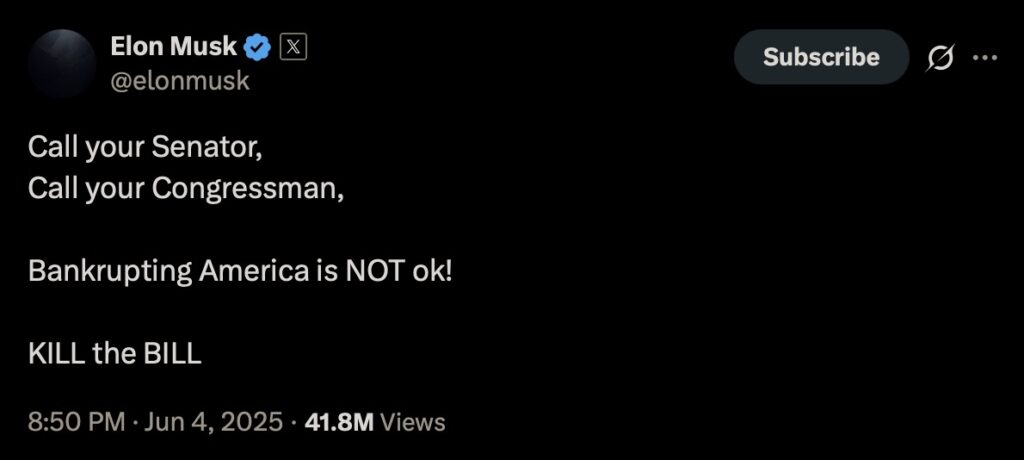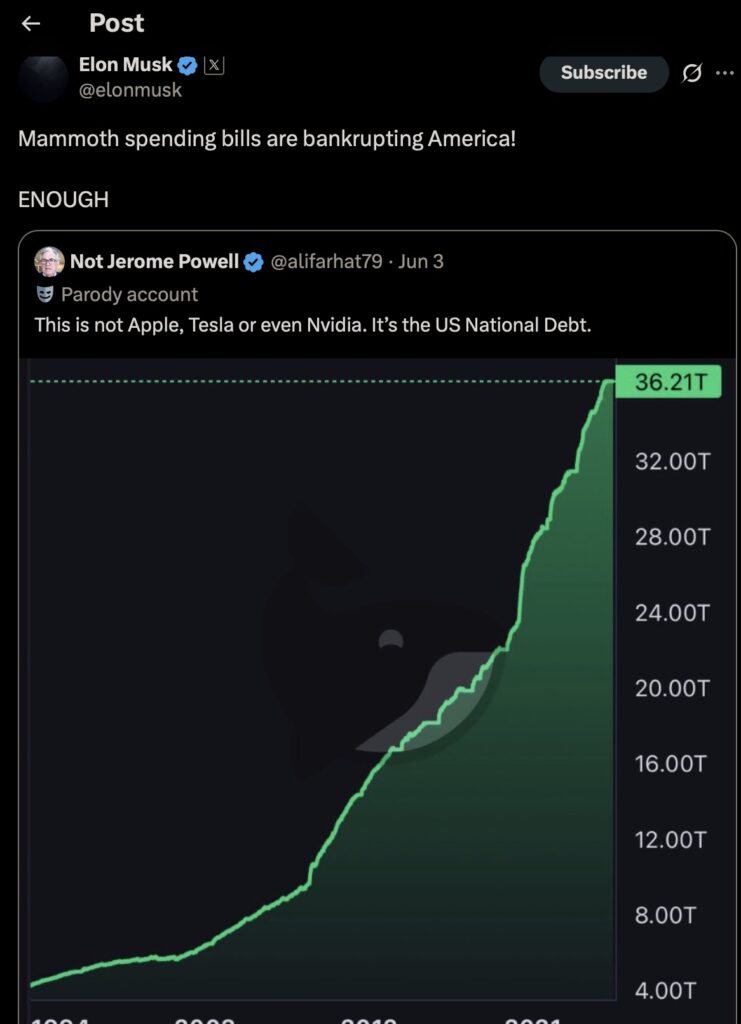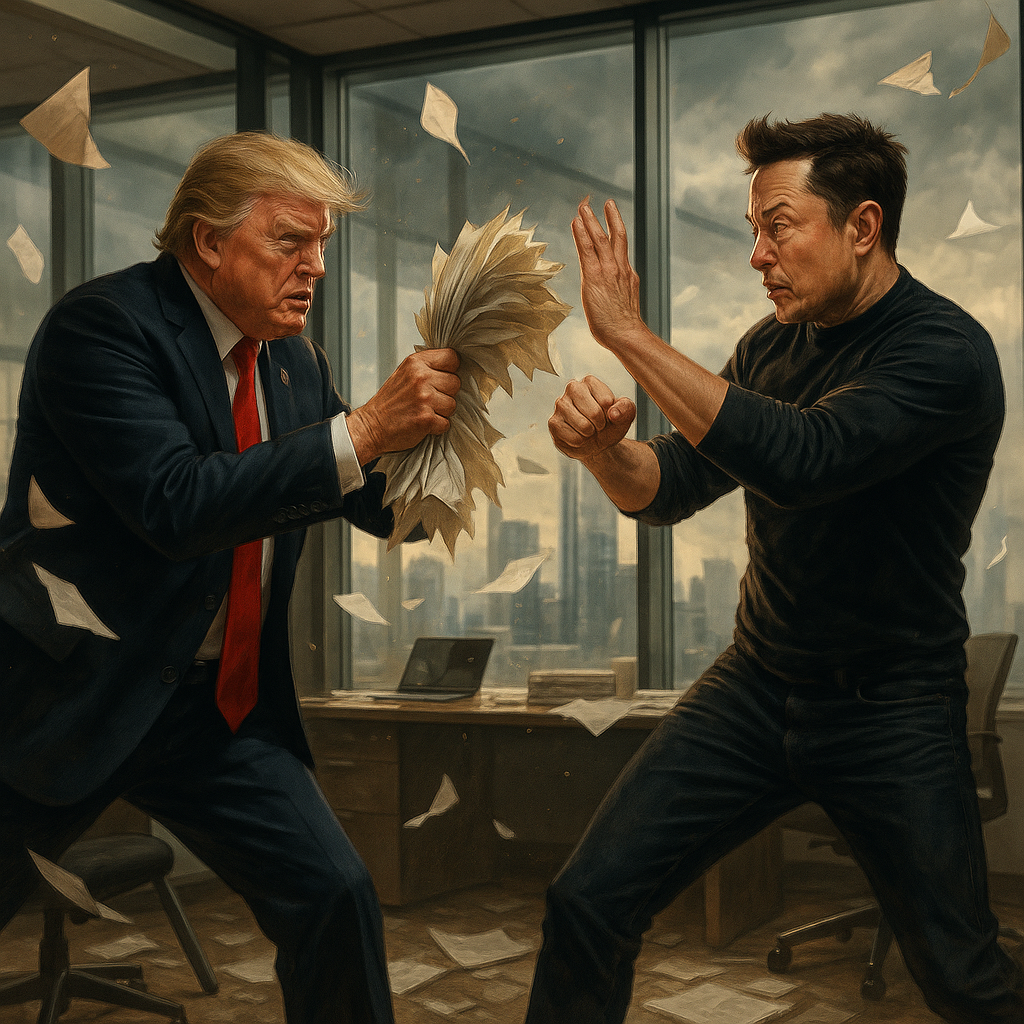Tech Titan Unleashes Social Media Storm, Widening Rift with Trump Administration
- Elon Musk has launched a fierce social media campaign against President Donald Trump’s signature spending bill, posting over 25 times on X in a single day to urge his 200 million followers to “KILL the BILL” due to its potential to bankrupt America.
- Tensions between Musk and the Trump administration are escalating, with disagreements spanning the bill’s deficit impact, cuts to electric vehicle tax credits, AI deals, and personnel decisions like the withdrawal of Musk ally Jared Isaacman’s NASA nomination.
- Despite pushback from Republican leaders like Speaker Mike Johnson, who defends the bill’s economic benefits, Musk remains unyielding, demanding a new bill that prioritizes fiscal responsibility over political expediency.
Elon Musk, the tech billionaire and influential voice on X, has reignited his political fervor with a relentless barrage of posts targeting President Donald Trump’s signature spending bill. On Wednesday alone, Musk posted or amplified criticisms of the megabill more than 25 times, calling it a “disgusting abomination” and instructing his over 200 million followers to contact their congressional representatives with a clear directive: “KILL the BILL.” His posts, laced with urgency and frustration, underscore a deepening divide between Musk and the Trump administration, revealing a complex web of policy disagreements and personal grievances. From mammoth deficits to electric vehicle (EV) tax credits, Musk’s latest crusade is not just a policy critique—it’s a public showdown.

Musk’s primary grievance centers on the bill’s fiscal irresponsibility. “Mammoth spending bills are bankrupting America! ENOUGH,” he declared in one post, while another bluntly stated, “Bankrupting America is NOT ok!” His concern over the bill’s reported $2.4 trillion deficit impact aligns with his broader stance on government spending, a position he’s held since at least July 2024 when he criticized subsidies for distorting market dynamics. Yet, Musk’s critique isn’t merely academic; it’s personal. Sources close to the billionaire reveal a widening rift with Trump’s administration over multiple issues, with the spending bill acting as a lightning rod for deeper frustrations. Musk’s insistence on a new bill—one that doesn’t balloon the deficit—clashes directly with political realities, as Speaker Mike Johnson dismissed the idea, citing time constraints and touting the legislation as an “extraordinary piece of legislation” with record tax cuts and savings.
Beyond the deficit, Musk’s opposition to the bill is layered with specific policy disputes, notably the proposed cut to the EV tax credit. While Musk publicly called for ending such credits post-November election, arguing they indirectly benefit Tesla by reducing competition, his company has recently shifted gears. Tesla, a vocal opponent of removing the $7,500 tax credit, warned on social media that “abruptly ending the energy tax credits would threaten America’s energy independence and the reliability of our grid.” This apparent contradiction has fueled speculation, with Trump himself claiming Musk’s opposition emerged only after learning of the EV mandate cut. While Trump’s assertion isn’t entirely accurate—given Musk’s long-standing critique of subsidies—the timing of Tesla’s lobbying efforts suggests the cut likely played a role in intensifying Musk’s public outcry.

The rift extends far beyond fiscal policy. Sources report Musk’s frustration with the Trump administration’s artificial intelligence deals, particularly those involving his competitor, OpenAI, while excluding his own AI startup. Behind closed doors, Musk raised objections to a deal that ultimately moved forward without his involvement, adding fuel to the fire. Trade policy disagreements also loom large, with Musk’s past public insults of trade advisor Peter Navarro—calling him a “moron” and “dumber than a sack of bricks” in April posts on X—highlighting long-simmering tensions. Perhaps most personal was the recent withdrawal of Jared Isaacman, a Musk ally, from consideration as NASA administrator. Sources indicate Musk was deeply disappointed by the move, viewing it as yet another slight from an administration he once supported.
Republican leaders, meanwhile, are pushing back against Musk’s influence. Senate Majority Leader John Thune downplayed concerns that senators might heed Musk’s calls, emphasizing that most Republicans see the bill as a driver of economic growth and job creation. Speaker Johnson was more direct, calling Musk “flat wrong” about the bill’s deficit impact and revealing he attempted to reach the billionaire by phone, only to be ignored. In response to Johnson’s defense of the legislation, Musk doubled down on X, stating, “No one who actually reads the bill should be able to stomach it.” This public sparring underscores a stark divide: while Johnson and other GOP figures celebrate the bill’s benefits, Musk frames it as a betrayal of fiscal responsibility, a stance that resonates with his massive online following.

Trump himself has entered the fray, expressing disappointment in Musk during a recent statement. “I’ve helped him a lot,” Trump said, claiming Musk initially had “no problem” with the bill’s inner workings before suddenly opposing it over the EV mandate cut. While Musk’s broader criticisms of government spending predate this specific issue, Trump’s frustration highlights the personal stakes of this conflict. Musk, once a key ally in Trump’s orbit, now appears to be a thorn in the administration’s side, using his unparalleled platform on X to shape public opinion and pressure lawmakers.
What makes Musk’s campaign so striking is not just its intensity but its timing. Until recently, Musk had scaled back his political commentary, focusing instead on his ventures like Tesla and SpaceX. His return to the political arena with such ferocity signals a shift, perhaps driven by a combination of policy disagreements and personal slights. With over 200 million followers, Musk wields a megaphone few can match, and his repeated calls to “KILL the BILL” are unlikely to go unheard, even if GOP leaders dismiss his influence. Whether his social media storm will sway congressional votes remains uncertain, but it has undeniably amplified the debate around Trump’s legislative agenda.
As this saga unfolds, the clash between Musk and the Trump administration serves as a microcosm of broader tensions in American politics: the struggle between fiscal conservatism and political pragmatism, the influence of tech titans in policy debates, and the power of social media to shape narratives. Musk’s unrelenting criticism—paired with his refusal to back down in the face of pushback from Johnson, Thune, and Trump himself—suggests this battle is far from over. For now, Musk’s message to his followers remains clear: call your representatives, challenge the status quo, and demand a future that doesn’t bankrupt America. Whether Congress listens or not, one thing is certain—Elon Musk has no intention of staying silent.
